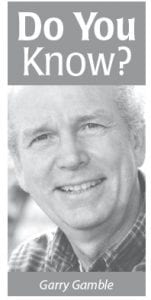Words have become the “sheep’s clothing” of present-day messaging. Like Aesop’s allegorical fable depicting a Big Bad Wolf that cloaked the nefarious in the innocuous – the “clothing” of a lamb – words serve as the “hide” to deliver emotionally charged messages fraught with subversive ideas.
As behavioral scientists continue to uncover the power of words to effect behavioral change, the capacity of rhetoric increasingly becomes an influential surgical tool in altering thought. As George Orwell’s dystopian novel 1984 suggests, “If thought corrupts language, language can also [conversely] corrupt thought.”
Steven Poole, British author and journalist, writing in his 2006 book Unspeak, “Words are the most lethal weapons used in the battle for hearts and minds.” According to Poole, “ ‘Unspeak’ is a rhetorical way of naming an issue so as to avoid having to argue one’s position, and to render the opposing position inexpressible.”
Which gets to my point and the title for this week’s column: “Who ‘Owns’ the Words?”
Who defines what’s real, appropriate, just, healthy, lawful, or in “our” best interest? What is truth and who’s the authority? When is news considered “real,” as opposed to “fake”? When is “science” science and not labeled “pseudoscience”? When do we preach “tolerance,” and in the very next breath ascribe “hate speech”? When did “political correctness” take over for basic morality? When did “justice” get re-imagined in every form thinkable to further political agenda? Justice, an inherently honorable word, has been bastardized – excuse my French – with coercive intent (weakening or destroying an opponent’s political, social, or societal will, and forcing a course of action favorable to a particular ideology). Coercion’s primary tools are the use of words, images and ideas.
Nat Hentoff, before his death in early January of this year – champion of a classical liberalism that is no longer in vogue – wrote for the Village Voice for 50 years and later a column titled, “Sweet Land of Liberty.” Hentoff saw “political correctness” for what it is — a threat to free speech and the free exchange of ideas, and he denounced it in its various incarnations. He was appalled at the enemies of free speech who began to dominate America’s campuses as the new century dawned.
In 1992, Hentoff wrote, “Free Speech for Me – But Not for Thee,” which summed up his feelings about censorship on both the left and right.
Unfortunately, appealing to present day “groupthink,” or what author Nicholas McFarlane refers to as “herd identity,” appears futile in today’s emotionally charged environment. Similar to a fuse, words can ignite a powder keg of emotions.
Groupthink is a psychological phenomenon that occurs within a group of people in which the desire for harmony or conformity in the group results in an irrational or dysfunctional decision-making outcome.
Group members reach a consensus decision without critical evaluation of alternative viewpoints by actively suppressing dissenting viewpoints, and by isolating themselves from outside influences. Furthermore, we’ve seen how groupthink can produce dehumanizing actions against anyone outside the group.
McFarlane suggests, “Propaganda [words] is used as a social harness which subliminally conveys appropriate threat and reward messages to control the herd’s energy and behavior, allowing the herd to be directed as they desire. The herd’s identify develops through its individuals’ combined adherence to an ideology.”
“The Hidden Persuaders,” first published in 1957, written by Vance Packard, an American journalist and social critic, explores the use of consumer motivational research and other psychological techniques, including depth psychology and subliminal tactics, used in an effort to manipulate and “persuade.”
“The New Yorker,” commenting on Packard’s pioneering and prescient work, “A brisk, authoritative and frightening report on how manufacturers, fundraisers and politicians are attempting to turn the American mind into a kind of catatonic dough that will buy, give or vote at their command.”
This is wholly consistent with the view I’ve shared with many over the years: “We are all born into this world as a clump of malleable clay. Whoever has their hands on us, will shape the vessel; to honor or dishonor” – keep in mind, all the while the clay is hardening.
Actor Robin Williams, playing the role of English professor John Keating in the 1989 movie “Dead Poet’s Society,” impressed on his students at Welton Academy, “No matter what anybody tells you, words and ideas can change [read shape] the world.”
In a subjective world, where we are willing to accept that morality is relative and that “the end justifies the means,” we will continue to encounter wolves in sheep’s clothing. A well-delivered message which has had the correct amount of emotional spin applied to it, will allow the audience to remain unaware that any such incursion has taken place.
Former Cook County Commissioner Garry Gamble is writing this ongoing column about the various ways government works.



Loading Comments